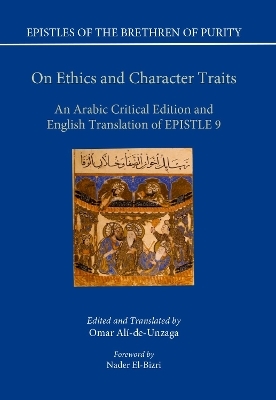
On Ethics and Character Traits
An Arabic Critical Edition and English Translation of Epistle 9
Seiten
2023
Oxford University Press (Verlag)
978-0-19-286419-2 (ISBN)
Oxford University Press (Verlag)
978-0-19-286419-2 (ISBN)
- Noch nicht erschienen
- Versandkostenfrei
- Auch auf Rechnung
- Artikel merken
Epistle 9 is a major treatise on ethics and character traits, which drinks from two sources: the Greek tradition, especially Plato, Aristotle, and Galen; and Islamic revelation.
This volume presents the original Arabic text of Epistle 9 of the Brethren of Purity, with a clear English translation, introduction, and notes. This epistle is a major medieval treatise on ethics and character traits, which drinks from two sources: the Greek tradition, especially Plato, Aristotle, and Galen; and Islamic revelation.
· Presents the original text with a clear new English translation
· Includes notes to technical concepts and obscure passages
· Provides an Introduction to the text, translation and edition
· The Epistles is a classic work of medieval Islamic learning
The Ikhwan al-Safa' (Brethren of Purity), the anonymous adepts of a tenth-century esoteric fraternity based in Basra and Baghdad, hold an eminent position in the history of science and philosophy in Islam due to the wide reception and assimilation of their monumental encyclopaedia, the Rasa 'il Ikhwan al-Safa' (Epistles of the Brethren of Purity). This compendium contains fifty-two epistles offering synoptic accounts of the classical sciences and philosophies of the age; divided into four classificatory parts, it treats themes in mathematics, logic, natural philosophy, psychology, metaphysics, and theology, in addition to didactic fables.
This volume presents the original text of Epistle 9, with a clear English translation, introduction, and notes. This epistle is a major treatise on ethics and character traits, which drinks from two sources: the Greek tradition, especially Plato, Aristotle, and Galen; and Islamic revelation. A true repository of virtues and vices, it explores four causes for the diversity of characters, defines five types of souls, and divides society into eight classes. The authors emphasize the dichotomy inward/outward, elevating the guides of the inward interpretation of revelation. They also include a sophisticated understanding of the symbolic meaning of Satan, which could be described as 'spiritual psychology'. The concept of renunciation of worldliness dominates the second half, as do descriptions of the 'Friends of God' as epitomes of moral virtues. Overall, the epistle contains numerous illustrative stories, an unusual number of Qur'anic verses and hadith, and also rare examples of pseudo-quotes from the Biblical tradition and munajat-style texts.
This volume presents the original Arabic text of Epistle 9 of the Brethren of Purity, with a clear English translation, introduction, and notes. This epistle is a major medieval treatise on ethics and character traits, which drinks from two sources: the Greek tradition, especially Plato, Aristotle, and Galen; and Islamic revelation.
· Presents the original text with a clear new English translation
· Includes notes to technical concepts and obscure passages
· Provides an Introduction to the text, translation and edition
· The Epistles is a classic work of medieval Islamic learning
The Ikhwan al-Safa' (Brethren of Purity), the anonymous adepts of a tenth-century esoteric fraternity based in Basra and Baghdad, hold an eminent position in the history of science and philosophy in Islam due to the wide reception and assimilation of their monumental encyclopaedia, the Rasa 'il Ikhwan al-Safa' (Epistles of the Brethren of Purity). This compendium contains fifty-two epistles offering synoptic accounts of the classical sciences and philosophies of the age; divided into four classificatory parts, it treats themes in mathematics, logic, natural philosophy, psychology, metaphysics, and theology, in addition to didactic fables.
This volume presents the original text of Epistle 9, with a clear English translation, introduction, and notes. This epistle is a major treatise on ethics and character traits, which drinks from two sources: the Greek tradition, especially Plato, Aristotle, and Galen; and Islamic revelation. A true repository of virtues and vices, it explores four causes for the diversity of characters, defines five types of souls, and divides society into eight classes. The authors emphasize the dichotomy inward/outward, elevating the guides of the inward interpretation of revelation. They also include a sophisticated understanding of the symbolic meaning of Satan, which could be described as 'spiritual psychology'. The concept of renunciation of worldliness dominates the second half, as do descriptions of the 'Friends of God' as epitomes of moral virtues. Overall, the epistle contains numerous illustrative stories, an unusual number of Qur'anic verses and hadith, and also rare examples of pseudo-quotes from the Biblical tradition and munajat-style texts.
Omar Alí-de-Unzaga is the Academic Coordinator of the Qur'anic Studies Unit at the Institute of Ismaili Studies, London, where he is also a lecturer. He is the series editor of the Qur'anic Studies Series (OUP/IIS). He has edited the volume Fortresses of the Intellect: Ismaili and Other Islamic Essays in Honour of Farhad Daftary (2011) and has published a number of articles on the Epistles of the Pure Brethren. He obtained his PhD from the University of Cambridge in 2005.
| Erscheinungsdatum | 28.10.2022 |
|---|---|
| Reihe/Serie | Epistles of the Brethren of Purity |
| Verlagsort | Oxford |
| Sprache | englisch |
| Maße | 156 x 234 mm |
| Themenwelt | Geisteswissenschaften ► Philosophie ► Östliche Philosophie |
| Geisteswissenschaften ► Religion / Theologie ► Islam | |
| ISBN-10 | 0-19-286419-X / 019286419X |
| ISBN-13 | 978-0-19-286419-2 / 9780192864192 |
| Zustand | Neuware |
| Haben Sie eine Frage zum Produkt? |
Mehr entdecken
aus dem Bereich
aus dem Bereich


